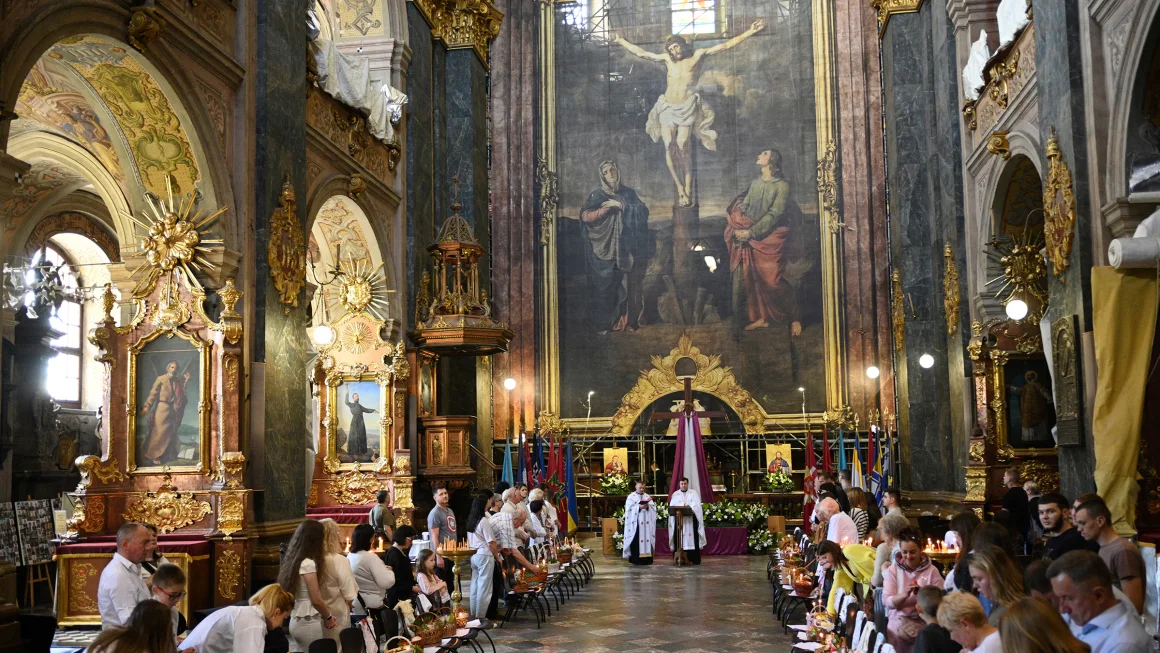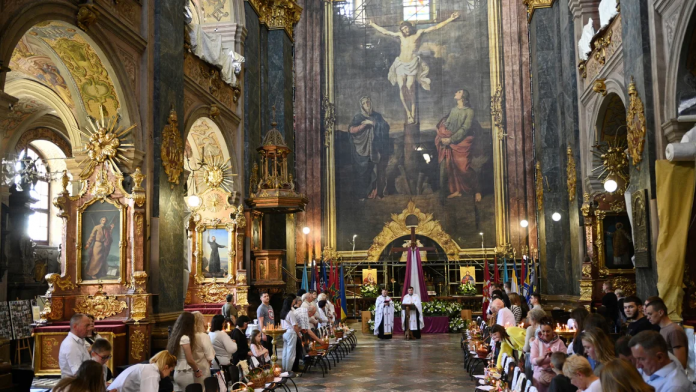ยูเครนกำลังเพิ่มความพยายามที่จะขจัดอิทธิพลของรัสเซียออกจากสถาบันทางศาสนา ในวันประกาศอิสรภาพของยูเครน ประธานาธิบดีโวโลดีมีร์ เซเลนสกี ได้ลงนามในกฎหมายห้ามกลุ่มศาสนาที่มีความเกี่ยวข้องกับรัสเซีย โดยมีเป้าหมายหลักคือโบสถ์ยูเครนออร์โธดอกซ์ Ukrainian Orthodox Church (UOC) ซึ่งมีการเชื่อมโยงทางประวัติศาสตร์กับโบสถ์ออร์โธดอกซ์รัสเซีย กฎหมายดังกล่าวผ่านรัฐสภาเมื่อวันที่ 20 สิงหาคม โดยให้เวลา UOC และกลุ่มอื่นๆ เป็นเวลาเก้าเดือนในการตัดความสัมพันธ์กับรัสเซีย หรือไม่ก็เผชิญการปิดตัว แม้ว่า UOC จะอ้างว่าทำลายความสัมพันธ์ในปี 2565 แต่หน่วยงานของรัฐของยูเครนยืนยันว่ายังคงมีความเชื่อมโยงอยู่ หน่วยรักษาความปลอดภัยของยูเครน Ukraine’s Security Service (SBU) ได้ตั้งข้อหานักบวช UOC เกือบ 50 คน ฐานเผยแพร่โฆษณาชวนเชื่อที่สนับสนุนมอสโก โดยมี 26 คนที่ถูกตัดสินโทษแล้ว
บาทหลวงคนหนึ่งถูกตัดสินจำคุก 5 ปีฐานปกป้องการรุกรานของรัสเซียในการเทศนาและเรียกร้องให้นักบวชสนับสนุนรัสเซีย กฎหมายใหม่ซึ่งห้ามกิจกรรม Patriarchate ของมอสโกในยูเครน ถูกมองว่าเป็นความเคลื่อนไหวเพื่อลดอิทธิพลของรัสเซีย ตามการระบุของ Mykyta Poturaiev ผู้สนับสนุน ชาวยูเครนส่วนใหญ่เป็นชาวออร์โธดอกซ์ และคริสตจักรของพวกเขาในอดีตอยู่ภายใต้การควบคุมของมอสโก อย่างไรก็ตาม หลังจากที่รัสเซียผนวกไครเมียในปี 2557 คริสตจักรออร์โธดอกซ์ของยูเครนก็แตกแยก ในปี 2562 คริสตจักรออร์โธดอกซ์แห่งยูเครนซึ่งมีสำนักงานใหญ่ในเคียฟ ได้รับการยอมรับอย่างเป็นทางการ Metropolitan Epiphanius มองว่ากฎหมายเป็นวิธีการปกป้องอิสรภาพทางจิตวิญญาณของยูเครนจากรัสเซีย
จากการสำรวจเมื่อเดือนเมษายน 2567 โดยสถาบันสังคมวิทยานานาชาติเคียฟ Kyiv International Institute of Sociology (KIIS) พบว่า 83% ของชาวยูเครนสนับสนุนการแทรกแซงของรัฐใน UOC ในระดับหนึ่ง โดย 63% เห็นด้วยกับการห้ามคริสตจักรโดยสิ้นเชิง Metropolitan Clement โฆษกของ UOC วิพากษ์วิจารณ์ร่างกฎหมายดังกล่าวบน Facebook โดยเรียกมันว่าเป็นความพยายามที่จะ “แบ่งคนออกเป็นพลเมืองที่ถูกและผิด” นอกโบสถ์ UOC ในเคียฟ นักบวชวัย 47 ปีคนหนึ่งแสดงความคับข้องใจโดยกล่าวว่า “ตอนนี้รัฐบาลกำลังคืบคลานเข้าไปในจิตวิญญาณของฉัน มันขึ้นอยู่กับฉันที่จะตัดสินใจว่าฉันจะอธิษฐานอย่างไร”
Ukraine’s president signs a law prohibiting religious groups with ties to Russia.

Ukraine is intensifying its efforts to remove Russian influence from religious institutions. On Ukraine’s Independence Day, President Volodymyr Zelensky signed a law banning religious groups with ties to Russia, primarily targeting the Ukrainian Orthodox Church (UOC), which has historical links to the Russian Orthodox Church. The law, passed by parliament on August 20, gives the UOC and other groups nine months to sever ties with Russia or face closure. Despite the UOC’s claim of breaking ties in 2022, Ukraine’s State Service insists the connections remain. Ukraine’s Security Service (SBU) has charged nearly 50 UOC clergymen with spreading pro-Moscow propaganda, with 26 already sentenced.
A cleric was sentenced to five years for defending Russia’s invasion in his sermons and urging parishioners to support Russia. The new law, banning Moscow Patriarchate activities in Ukraine, is seen as a move to curb Russian influence, according to its sponsor, Mykyta Poturaiev. Most Ukrainians are Orthodox, and their churches were historically under Moscow’s control. However, after Russia annexed Crimea in 2014, Ukraine’s Orthodox churches split. In 2019, an independent, Kyiv-based Orthodox Church of Ukraine was officially recognized. Metropolitan Epiphanius sees the law as a way to protect Ukraine’s spiritual independence from Russia.
According to an April 2024 survey by the Kyiv International Institute of Sociology (KIIS), 83% of Ukrainians supported some level of state intervention in the UOC, with 63% favouring a complete ban on the church. Metropolitan Clement, a UOC spokesperson, criticised the bill on Facebook, calling it an attempt to “divide people into right and wrong citizens.” Outside a UOC church in Kyiv, a 47-year-old parishioner expressed frustration, saying, “The government is now creeping into my soul. It is up to me to decide how I pray.
By CNN NEWS

















